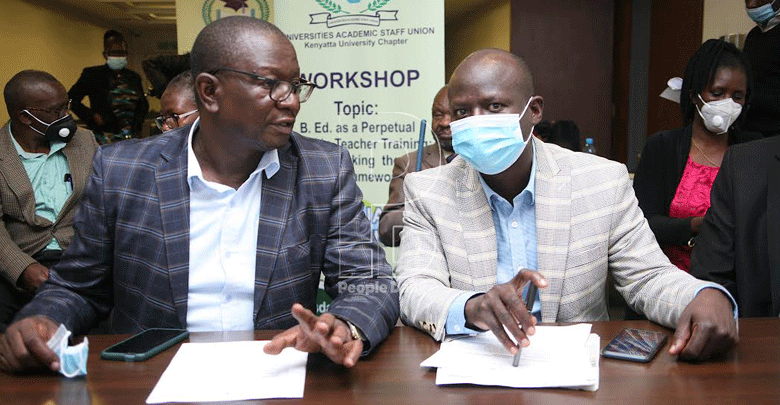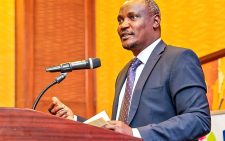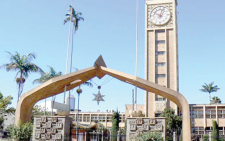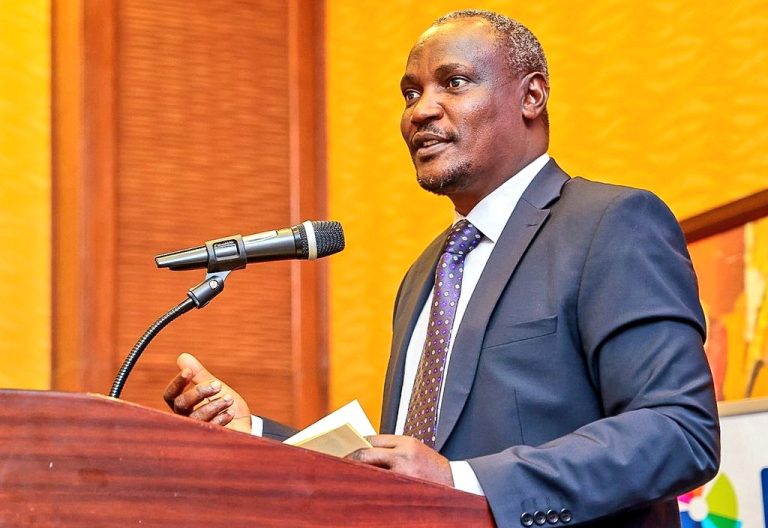KU dons criticise plan to scrap education degree programme

Irene Githinji @gitshee
A transformative agenda by the Teachers Service Commission (TSC) to see reforms to teacher training in universities and colleges has raised concerns among lecturers.
In the proposals, outlined in the 36-page document dubbed TSC Framework for Entry Requirement in the Teaching Service, the 8-4-4 and Competence Based Curriculum (CBC) students will have to undertake Bachelor of Arts or Bachelor of Science courses for three years majoring on the key subjects and then pursue Postgraduate Diploma in Education (a teacher education educators programme) to be able to teach at junior and senior secondary school as well as Special Needs Education for one year.
Universities Academic Staff Union (UASU) Kenyatta University (KU) Chapter Secretary General, Dr George Makokha, says the TSC framework insinuates that the quality of teacher training in the country is wanting and recommends a number of changes that touch on university education.
“The TSC recommends scrapping of Bachelor of Education programme as a measure to improve and ensure quality through mastery of content in the teaching service.
There is no empirical evidence that casts doubt on the quality of graduates of the programme,” says Dr Makokha.
He said they have issues with the fact that the framework recommends training in three teaching subjects instead of the current two.
“If it is true as alleged about the quality of the teachers and hence the scrapping of B.Ed programme, the quality will be compromised more if the teacher trainee will have additional subjects.
The union thinks this is a subtle strategy by TSC to deny employment to thousands of teachers who remain unemployed to date,” Dr Makokha explains.
Similarly, the KU lecturers condemned the development of TSC framework, saying it was not procedural because it lacked public participation of key stakeholders and did not follow the process of reviewing and making changes in university academic programmes.
“TSC can only play an advisory role to relevant authorities of university education such as Commission for University of Education (CUE) and university senates that have the mandate of coming up with and reviewing programmes if there are issues with existing ones,” explains Dr Makokha.
He also said the framework has not demonstrated that a review, which separates weighted factors that influence education standards based on their relative importance, was ever done, noting that its recommendations are subjective and cannot be relied upon.
“The framework lauds that learner centred classroom and personalised instruction are key features of the 21st century teachers, but makes no reference to huge classroom sizes in universities that undermine the same,” he says.
The KU lecturers regret that the framework compares teaching to other professionals, such as medicine, law, engineering among others that admit undergraduate trainees in those disciplines right from inception and wondered why teaching should be treated differently.
According to them, the TSC model of supply and demand will deny Kenyan teachers jobs on the global market.
They have since insisted that Bachelor of Arts and Sciences should continue being issued to interested candidates.
Dr Makokha says while the union supports change that will help improve the quality of university education, it will resist any change that affects members of staff negatively, such as scrapping the Bachelor of Education programme.
“Any purported deficiencies in the programme must be supported by empirical data upon which universities and CUE can rely on to improve it, but not phase it out.
This approach is the essence of curriculum mapping and reviews as routine practices in the universities,” he said.
The plan has also caused panic among unemployed teachers that they could be locked out of jobs.
However, TSC appeared to change its stance on the issue last week, saying a decision has not been made as yet.
The commission allayed fears over the status of the education programme, saying it has no powers to scrap any university programme.
TSC Chairperson, Dr Nancy Macharia, last week said the role of determining degrees to be offered in universities is the sole prerogative of universities’ senate, which is in charge of academic programmes under regulation of CUE.
“TSC’s mandate is limited to reviewing and advising on standards of education and training of persons entering the teaching service in the country,” assured Macharia, who spoke during the release of Form One selection results.
Macharia said the university deans of education have been engaged aggressively in these discussions and are about to turn in their views.
She added that the commission is determined to make Kenyan teachers the envy of the world.
“Various efforts have been made to ensure that the Kenyan teacher is empowered and motivated to provide formidable quality of teaching to our children,” she added.
TSC launched the report of the Taskforce on Enhancing Access, Relevance, Transition, Equity and Quality for Effective Curriculum Reforms Implementation four months ago.
According to Macharia, the report recommended new entry grades for teachers wishing to be registered to practise under the TSC.
Based on the report’s recommendations, she said TSC has initiated a robust stakeholder engagement process, especially with universities, to reach a consensus on the most suitable options that will produce the best professional teacher that will be registered by the TSC to teach secondary school.
TSC says the document is supported by the Constitution, which mandates it to register trained teachers, review standards of education and training of persons entering the teaching profession and reviewing the demand for and supply of teachers.
“For Bachelor of Education, the course takes four years without any requirement for attachment or internship. No requirement for annual renewal of registration,” said TSC.
But the UASU-KU chapter said they will not accept doing away with the programme and dismissed the TSC document, which changes teacher training in university.
“From the face value of it, the union will reject the document because what the TSC wants to do is to scrap off Bachelor of Education programme so that all students are just admitted for Bachelor of Arts or Science.
It is not the right thing to do and again, it was done without consultation or thinking on how to improve training on Bachelor of Education,” the KU lecturers said.











